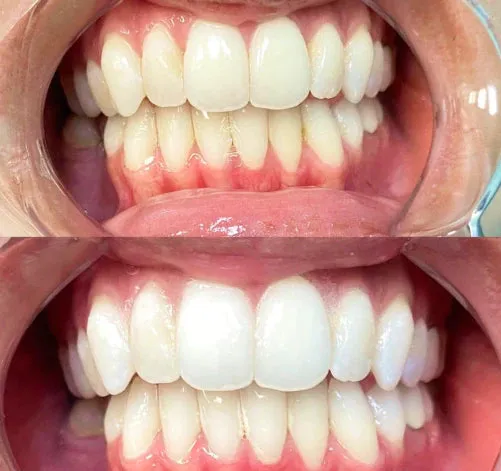Investing in a teeth whitening franchise can be a lucrative opportunity for entrepreneurs looking to enter the booming dental aesthetics market. With the increasing demand for cosmetic dental procedures, a teeth whitening franchise provides a pathway to a profitable business with established brand recognition and proven business models. This article explores the top 5 benefits of investing in a teeth whitening franchise, giving you a comprehensive overview to make an informed decision. We’ll delve into the financial aspects, operational requirements, and legal considerations, providing a roadmap to success in this thriving industry. Furthermore, we’ll examine the market trends and the target audience, providing a good understanding to build a solid foundation for your franchise.
Teeth Whitening Franchise Top 5 Benefits
High Earning Potential
One of the primary advantages of a teeth whitening franchise is its high earning potential. The demand for teeth whitening services is consistently high, driven by the desire for brighter, more aesthetically pleasing smiles. Franchisees benefit from a business model with a proven track record of profitability. The initial investment can yield significant returns as customer acquisition costs are often lower due to the established brand recognition and marketing support provided by the franchisor. Furthermore, the recurring revenue streams, such as follow-up treatments and product sales, contribute to the overall financial success of the franchise. The franchise also capitalizes on impulse purchases as teeth whitening is often perceived as an accessible and relatively affordable cosmetic procedure, encouraging customers to indulge in the service.
Leveraging Established Brand Recognition

Choosing a franchise allows entrepreneurs to benefit from pre-existing brand recognition. A well-known teeth whitening franchise has already established its presence in the market, building trust and credibility with potential customers. This can translate into a higher customer acquisition rate compared to starting an independent business from scratch. The franchise’s reputation and brand image will often attract customers looking for quality services. This established brand equity simplifies marketing efforts and reduces the time and resources needed to build awareness and a customer base. Franchisees can leverage the franchisor’s marketing campaigns, which are typically targeted and professionally executed, making it easier to reach and convert potential clients. This built-in advantage contributes significantly to the franchisee’s overall success.
Comprehensive Training and Support
Franchisors provide comprehensive training and ongoing support, especially beneficial for those new to the dental or business fields. This training covers various aspects of the business, including operational procedures, customer service, and marketing strategies. Franchisees receive training on the latest teeth whitening techniques, product knowledge, and safety protocols, ensuring they can deliver high-quality services. Ongoing support from the franchisor helps franchisees navigate challenges, troubleshoot issues, and stay updated on industry trends. This support system often includes regular business reviews, marketing assistance, and access to a network of other franchisees. This level of guidance significantly reduces the learning curve and increases the chances of success for the franchisee.
Access to Proven Business Models
Franchises offer proven business models that have been refined and tested over time. These models incorporate best practices for operations, customer service, and financial management, reducing the risk associated with starting a new business. Franchisees receive detailed operational manuals that outline all necessary procedures, ensuring consistency across all locations. Furthermore, the franchisor provides strategies for efficient inventory management, staff scheduling, and customer relationship management. The proven business model also includes effective marketing and advertising strategies, making it easier to attract and retain customers. This structured approach enables franchisees to focus on delivering exceptional service, while the franchisor handles the core operational aspects.
Scalability and Growth Opportunities

A teeth whitening franchise offers significant scalability and growth opportunities. Once the initial franchise is established, franchisees can explore options for expanding their business, such as opening additional locations. Franchisors often provide guidance and support for multi-unit ownership. The ability to scale the business depends on the market demand and financial resources. Furthermore, franchisees can diversify their service offerings to include other cosmetic dental procedures. This allows for increased revenue streams and attracts a broader customer base. The established brand recognition and proven business model make it easier to secure financing and expand operations. Franchises provide the flexibility to grow the business at your own pace, providing a rewarding path to building a substantial business.
Understanding the Teeth Whitening Market
Market Demand and Trends
The market for teeth whitening services is driven by the desire for improved aesthetics and overall self-image. Market trends indicate consistent growth due to advancements in technology and a wider acceptance of cosmetic procedures. Consumers are increasingly seeking professional teeth whitening solutions for quicker and more effective results. The demand is further fueled by social media trends and the influence of celebrities promoting brighter smiles. This consistent demand ensures that franchisees have a steady stream of potential clients. It’s important for the franchise to understand market trends to adapt their services and marketing strategies. This will allow them to remain competitive and appeal to the evolving needs of the target audience.
Competitive Landscape

The competitive landscape of the teeth whitening industry includes both established franchise brands and independent businesses. When evaluating a franchise, understanding the competition in the local market is crucial. The franchisee must analyze the pricing strategies, service offerings, and marketing efforts of competitors to differentiate themselves. A strong brand reputation, high-quality service, and effective marketing can set a franchise apart from its competitors. Also, consider the pricing strategies and service offerings, and identify opportunities to offer value-added services that competitors may not provide. Keeping ahead of the latest technologies and techniques is important for retaining a competitive advantage.
Target Audience Analysis
Identifying and understanding the target audience is essential for a successful teeth whitening franchise. The primary target audience often includes adults aged 25-55 who are conscious about their appearance and willing to invest in cosmetic enhancements. Franchisees must understand the demographics, preferences, and needs of this target audience to tailor their services and marketing strategies. Segmenting the market and offering different services based on customer needs can maximize profitability. Gathering feedback from clients is essential to understanding the customer base. Tailoring marketing campaigns to reach the target audience through social media, local advertising, and partnerships with other businesses will improve customer acquisition.
Franchise Costs and Investment
Initial Franchise Fee

The initial franchise fee represents the cost of acquiring the franchise rights and is typically paid upfront. This fee grants franchisees the right to use the franchisor’s brand, business model, and support system. The fee varies depending on the franchise, brand recognition, and market potential. Franchisees should carefully evaluate the value offered by the franchisor to determine whether the initial fee aligns with the benefits. The initial fee is usually a one-time payment, but it is a significant investment, so be sure to analyze all aspects before signing the agreement. Franchisees must consider the long-term value of the franchise and the potential return on investment when evaluating the fee.
Ongoing Royalties and Fees
Ongoing royalties and fees are a recurring expense paid to the franchisor, typically a percentage of the franchisee’s gross revenue. These fees support the franchisor’s ongoing support, marketing efforts, and brand development. Franchisees should understand the fee structure and its impact on their profitability. Careful analysis of the franchise agreement is crucial to understand the royalty structure. These fees contribute to the overall success of the franchise by funding marketing campaigns, research and development, and ongoing support for franchisees. Transparent communication and a clear understanding of these fees are essential for a successful franchisor-franchisee relationship.
Startup Costs Breakdown
A detailed startup cost breakdown is important for potential franchisees. This includes expenses such as the initial franchise fee, leasehold improvements, equipment purchases, initial inventory, and working capital. Franchisees should carefully review the financial projections provided by the franchisor and create their own detailed budget. Obtaining financing or securing investment is a crucial part of covering startup costs. Understanding these costs provides clarity on the total investment required and enables franchisees to make informed financial decisions. Consult with financial advisors to develop a robust business plan that includes these expenses.
Operational Requirements and Day-to-Day

Staffing and Training
Staffing and training are key aspects of operational success. Franchisees need to hire qualified technicians and customer service representatives to deliver high-quality teeth whitening services. The franchisor will provide training programs to ensure staff members are proficient in the latest techniques. Ongoing training is essential to keep up with industry advancements and maintain high service standards. Also, staff training should include customer service protocols to ensure customer satisfaction and retention. Franchisees should also implement employee performance evaluations to assess and encourage improved productivity and efficiency.
Marketing and Advertising Strategies
Effective marketing and advertising are essential for attracting and retaining customers. Franchisors provide marketing materials and strategies, including digital marketing campaigns, local advertising, and promotional offers. Franchisees should leverage these resources and tailor them to their local market. A strong online presence through a professional website and active social media profiles is crucial for brand visibility. Local partnerships and community outreach can boost brand awareness and customer engagement. Measuring the effectiveness of marketing efforts through data analytics helps optimize campaigns and maximize return on investment. Franchisees should be open to exploring various advertising avenues and adapting their strategies based on market trends and customer feedback.
Inventory Management

Effective inventory management is key to operational efficiency. Franchisees need to manage the inventory of teeth whitening products and supplies to ensure they meet customer demand. Following the franchisor’s guidelines for product ordering, storage, and utilization is recommended. Accurate inventory tracking helps minimize waste and ensures products are available when needed. Franchisees can use technology to streamline inventory management processes, like using inventory software. Regular inventory audits help to identify and address any discrepancies or issues. Optimizing inventory management ensures that franchisees maintain high-quality standards. Proper management also contributes to cost-effectiveness and efficiency in operations.
Legal and Regulatory Considerations
Franchise Agreement Review
Before investing in a teeth whitening franchise, franchisees must carefully review the franchise agreement. The agreement outlines the rights and obligations of both the franchisor and the franchisee. It covers important aspects such as the franchise fee, royalties, territory, and operational guidelines. Seeking legal advice from a franchise attorney can help ensure that the agreement is fair and aligned with the franchisee’s interests. Understanding the agreement and seeking clarification on any points of concern is crucial before signing. A comprehensive review will prevent potential disputes or misunderstandings in the future. Be sure you understand the terms of termination, renewal, and transfer.
Compliance with Dental Regulations
Teeth whitening businesses must comply with dental regulations and standards. Franchisees need to ensure that they meet all local, state, and federal requirements. This includes obtaining any necessary licenses, permits, and adhering to safety protocols. Compliance ensures that franchisees are operating legally. It also ensures the safety of clients. Regular audits and inspections from regulatory bodies are standard practice in the industry. Franchisees should prioritize compliance to mitigate risks and build trust with their customers. Stay informed of changes in regulations. Keeping up to date is important for maintaining legal compliance.
Insurance and Liability
Franchisees should obtain appropriate insurance coverage to protect their business from potential liabilities. General liability insurance protects the business from claims related to property damage or injury. Professional liability insurance, also known as malpractice insurance, protects the business from claims related to the services provided. Workers’ compensation insurance is necessary to cover employee-related injuries or illnesses. Franchisees should review their insurance needs and work with insurance providers to obtain appropriate coverage. Adequate insurance coverage protects the financial health of the franchise. It also protects the franchisees from unexpected costs or litigation. Consult with an insurance professional to determine the required coverage.
In conclusion, investing in a teeth whitening franchise offers numerous benefits, including high earning potential, established brand recognition, comprehensive training, and proven business models. However, success requires careful planning, a thorough understanding of the market, and adherence to legal and operational requirements. By considering the top 5 benefits discussed in this article and implementing the strategies outlined, entrepreneurs can maximize their chances of building a successful and profitable teeth whitening franchise. Always perform thorough due diligence and consult with legal and financial advisors to make informed decisions.
